#personal conlang
Text
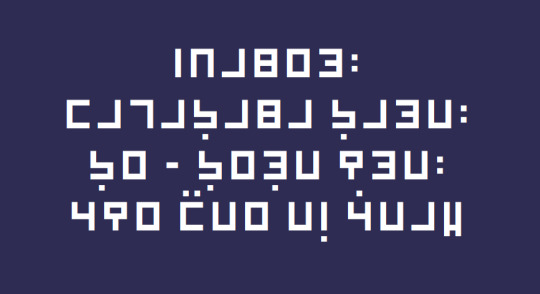
Enathos,
katabatha basi,
bo - bozi usi,
fuo chio ir via.
Enter,
be greeted well,
you're a friend here,
for this is me.
4 notes
·
View notes
Text
Writer woes
Been simmering on a novel for almost a year. Because I want to write it, but it's a fantasy world, and it is VITAL to my brain that the names of people and places are consistent.
So until I can name everything, everything is placeholder. Because I want to finish this conlang family first.
My hobbyist worldbuilder side is at war with my writer side. "No one will pay enough attention-" I WILL. I. WILL. It matters to ME that I know x y z about the planet. My brain relies on comprehending it as a real place.
But also. GAH.
#i do have it considerably narrowed down#i have two scrips that i need to make up the rules for#and from there i can make the human proto-lang and the alva proto-lang#it would also help if i had a map of this planet but that map can wait until i've got the rules down pat#writeblr#conlang#personal#text
51 notes
·
View notes
Text
(re: "Awoken headcanons") Once again thinking about how different generations prefer different descriptors; how diaspora/emigrants make new dialects and slang; how people who are learning a new language - or grew up bilingual but aren't fluent - encounter mishaps semi-regularly and always have a story to tell because of it.
Once again thinking about how those situations might apply to Awoken who know Speech [the Awoken language] or are learning it.
Later-generation Awoken speaking differently than the original 891 and Distributary Awoken, in the same way modern Japanese differs from older Japanese.
Earthborn and Reefborn using different words for items, like how backpack can be "mochila" and "bolso" and "backpack."
Awoken Guardians practicing Speech with their friends, and every time they forget a word ("Erð þið með <bottle opener>?") or mishear one ("An eagle is stealing chickens?") or mispronounce it, they have to start over because everyone is laughing so hard.
Earthborn forgetting Speech as a way to rebel. Earthborn being told that they're "not actually Awoken" if they don't know Speech. Awoken Guardians using Speech as a way to reconnect with themselves and their heritage. Reefborn changing words in Speech to bridge the divide between Reefborn and Earthborn, to unlearn old prejudices, to remember they aren't alone in the universe and that the legacy of the Awoken extends far beyond the Reef.
Once again thinking about language. ;A;
#yes this is connected to my personal experiences#brb gonna cry in a corner now#destiny the game#destiny 2#destiny lore#destiny fan lore#destiny fanon#destiny headcanon#linguistics#conlang#destiny awoken#crow-posting
30 notes
·
View notes
Text
making gendered 3rd person singular pronouns for your conlang? boring. making a ton of 1st person singular pronouns that denote a bunch of things which can be gender (but is usually not)? NOW we're talking.
#non-exhaustive list of what the 1st person singular pronouns in my fantasy conlang mean:#your humblest servant#your humblest servant but also i'm nonbinary#i am extremely detached from this situation and don't care about you#i am so fucking important and probably a woman or royalty#i am but a child/very young person from the countryside and i don't know anything aw shucks#i am wise and respected OR i am a history nerd. it's anyone's guess really#i am DEFINITELY a history nerd (masculine edition)
33 notes
·
View notes
Text
the difference btwn a class you love ending and a class you hate ending is night and day
#i was so distraught during conlangs and in my art class im pacing back and forth stimming in excitement#personal post
27 notes
·
View notes
Text
Thinking on Halsin's Child Name, I have come to the conclusion that - in my mind - it was simply "Re" or "Tōre"
Meaning, fittingly (though his parents didn't know it yet), bear or little bear.
#source: my brainrot#BG3 Musing#Halsin Posting#Halsin#i believe it said in a way that stresses it as 'baby bear' or 'little bear'#and his mother called him 'nharaigh' - sunshine/light#re is taken from general dnd media while tō is more from DnDAlley bless that conlang#you know what sometimes you just need meaningless fluff hcs#that are generally inconsequential#but all the talk of astarion potentially being his child name had me thinking#and going by that same conlang his name now might be#halsin ahn'tōre#on the nose? maybe - but you could say greatly influential to his life#halsin's custom made first longbow with 'little bear' carved on the inside#i wanna draw baby halsin again#maybe all of his brothers and sisters were child named after animals#okay technically re can also mean animal or person but elvish be elvish
32 notes
·
View notes
Note
not a question about any of your very cool languages I just wanted to say it's really awesome that you answer questions and expand on your thoughts that fans have about them. Thank you, Seda!
Thanks! You know I came back to Tumblr and I got back into asks, but then I kind of took a lot of time off. I came back to it because Lexember's starting up, but it gets to a point where sometimes I know the question is going to require an involved response or require some conlang work, and it's kind of daunting. But I got to get over that. I miss writing stuff.
Ste ku, you.
28 notes
·
View notes
Text
translation of the first verse from gliese 710 by king gizzard! almost every verb here is in the imperative mood, which posed a bit of a challenge. in irkan osla, unlike in english, the imperative declines based on number - either first person plural, or second person singular or plural. i went for 1PL because I thought it sounded almost like a sort of battlecry and less like a literal command, but the others would work too depending on your interpretation of the lyrics. i also decided to translate 'lava' as 'fire-river', since i don't think this culture would be familiar with active volcanoes.
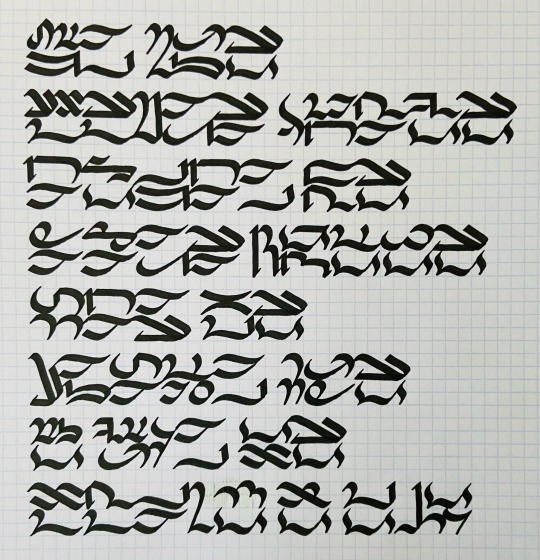
melt the ice
reheat the dead
terraform the planet
compress the lungs
eat the mushroom
cool the lava
watch the new star
dance upon the night sky
blüas ṭhuṣki
kxokomaŋka doanragiki
na'isünaas ërki
fahaaŋka ṇiiṇliphiki
khenaak ömki
kaṣkhalauas thufki
ṭṣi glutas ixki
xorosabaothi ḍi misit
gloss and IPA under the cut!
ice-II.SG.ABS melt-IMP.1PL
dead.ones-I.PL.ABS again-heat-IMP.1PL
world-II.SG.ABS transform-IMP.1PL
lung-I.PL.ABS compress-IMP.1PL
mushroom-I.SG.ABS eat-IMP.1PL
fire.river-II.SG.ABS cool-IMP.1PL
new star-II.SG.ABS watch-IMP.1PL
night.sky-II.SG.DAT in dance-INF
/ˈbly.as ˈʈʰuʂ.ki
ˈkxɔ.kɔ.maŋ.ka ˈdɔan.ra.gi.ki
ˈna.ʔi.sy.na.as ˈər.ki
ˈfa.ha.aŋ.ka ˈɳiːɳ.li.pʰi.ki
ˈkʰɛ.na.ak ˈœm.ki
ˈkaʂ.kʰa.lau.as ˈtʰuf.ki
ʈʂi ˈglu.tas ˈix.ki
ˈxɔ.rɔ.sa.ɔ.tʰi ɖi ˈmi.sit/
#i hope the imperative mood conjugation explanation makes sense idk if theres a better way of putting it tbh#looking back i maybe shouldve gone with a 2nd person imperative but i mean#it depends on how u look at it and im really bad at interpreting poetry#might also translate the other '(verb) the (noun)' type verses this was pretty fun#fun fact: this clong has six different words for love and the one for obsessive or manic love is 'khigi'#like 'ki'ng 'gi'zzard lol. from this the word 'khigul' is derived which can mean obsession but also special interest :3#conlang#my conlangs#neography#irkan osla#translation
33 notes
·
View notes
Text
This has been a pretty big year for me already.
In terms of conlanging, I started two big new personal language projects, started learning a new method of digital font making, took on more pro projects with new clients, and started a silversmithing-conlanging crossover project.
It’s only just March too.
I’ve never been a person who starts more than I can finish. So I’m confident I’ll see these projects through to their natural conclusions. When will those conclusions be? That’s the question. I don’t even think I know.
In other news, I’ve been traveling a load. I went to Germany last fall and Arizona and Hawaii this year. I’m planning more international trips for the rest of the year, but I’m also working on a load of music stuff, which variously either keeps me in place *or* sends me thousands of miles away. Hence the recent Hawaii trip, in which my husband toured with five separate groups and he and I performed more conlang songs (as well as video game covers and other originals) once again in the islands we used to live in.
Ana Lemma, the band we started, has grown over the last year. We somehow convinced an absolutely stellar drummer to join us, as well as our dear friend who is a rockstar-level violinist. We are looking to add a guitarist, but things have been on hold until we find the exactly right person. This summer, like most summers in Alaska, will probably be an explosion of activity, growth, change, and progress, broadly. We are looking forward to playing gigs around the state and possibly beyond.
It’s been only about 15 months since I finished my PhD. I thought my life would slow down after that, but it really only sped up in all the other ways that I didn’t have time to devote to while I was dissertating. I’m happy to be able to take other pursuits and passions off the back burner and give them the attention I want to.
8 notes
·
View notes
Text
Danganronpa in toki pona part 1: names
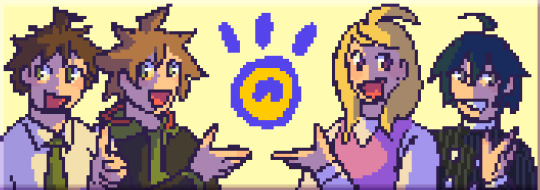
toki!
since Im both a danganronpa fan and a conlang enjoyer, I had the idea a while ago to try and translate parts of it into toki pona (not whole games, god no. just snippets, maybe some ftes). while I assume this is mostly going to interest people who already know about conlangs, I still want it to be readable by people who have never heard of them in their life. so
what is toki pona?
toki pona is a conlang (short for constructed language, a language someone made up, think: esperanto or tolkiens languages. theres a lot I could talk about here but rn thats all you need to know) made by sonja lang. it was created to be as minimalistic as possible with a vocabulary of about 120 - 150 words depending on who you ask. it onls has 9 consonants and 5 vowels, which means theres some restrictions for how you can transliterate names into toki pona (called 'tokiponization').
lets get into how that works
tokiponization
since tokiponization is based on pronounciation rather than spelling, its important to know what sounds were working with. this is where I might lose some folks that dont know any linguistics stuff, but this section is optional. you only need to read it to find out how the names turned out the way they did, and how to say them out loud.
consonants
the nine consonants of toki pona are m, n, p, t, k, s, w, l, j. these are pronounced like their ipa (international phonetic alphabet) counterparts. its not necessary to know what that means, just know that [j] is pronounced like english <y> (as in yes, not as in synth). everything is else is p much how an english speaker would expect it.
the way consonants are tokiponized goes as follows:
voiced stops and fricatives are devoiced (z, d, g, b > s, t, k, p)
labial fricatives (f, ɸ) become p
coronal fricatives (and affricates) (θ, ʃ, ɕ, ts, tʃ, tɕ) become s
the japanese r [r] becomes l (the english r [ɻ] becomes w)
h is dropped word-initially and becomes w or j intervocalically
v can become p or w but Ill use w here
vowels
toki ponas vowels are a, e, i, o, u. this is almost the same as japanese, which has ɯ instead of u, but since its just the same sound with a rounding difference its tokiponized as u. japanese also has a length distinction, which toki pona doesnt, meaning long and short vowels will simply be the same length.
syllables
toki ponas syllable structure is CV(n) meaning that each syllable must have a consonant and a vowel (except word-initially where it can be just a vowel) and can optionally end in n. this is fairly similar to japanese syllable structure, but one thing is that japanese has palatalized consonants. this is pretty easy to solve by just inserting -ij- to mimic the sound. generally with tokiponization its preferable to preserve syllable count rather than add extra sounds but 1) if you say it quickly its barely noticable and 2) its my project and I can do what I want.
the other thing is that while in toki pona, vowels need to be seperated by at least one consonant, japanese allows you to theoretically chain together as many vowels as you want. I tried to find out whether vowel sequences are pronounced as diphthongs or disyllabically and turns out its a little complicated because those terms are defined in terms of syllables and japanese is mora-timed rather than syllable-timed. Ill admit I only have the faintest clue what a mora is but for the purposes of this project I will be treating vowel sequences as seperate syllables when possible. if it isnt, due to the syllables wu, wo, ji, and ti being forbidden in toki pona, Ill treat them like diphthongs in that the second vowel is just dropped entirely.
some smaller notes:
the only phoneme allowed in syllable codas is n, so for example gundham becomes kantan
stress always falls on the first syllable
and the final, rather important thing
the way names work in toki pona is that you have to describe what the thing is before saying the name (for example, canada is called ma Kanata, which literally means canada-place). therefore people are generally called jan [name], however, some tokiponists use a different term before their name (called a head noun) either for fun or to express something about themselves (such as many plural systems using kulupu ("group")).
theres quite a few options for varying what head nouns someone uses for themselves or others to add nuances. for example, I think gundham might refer to himself as a jan wawa ("powerful (in the sense of supernatural powers in this case) person"), or perhaps hiyoko might call mikan a jaki instead of a jan to insult her. theres a lot of fun to be had here.
the actual names
THH:
jan Makoto Najeki
jan Kijoko Kilikili (note: kili is the toki pona word for fruit so her name here literally says fruit-fruit)
jan Pijakuja Tokami
jan Toko Pukawa
jan (moli) So (note: jan moli here would mean killer to translate the spirit of her original title better, but since her talent would include it anyways Im not sure whether to use it?)
jan Sajaka Masono
jan Lejon Kuwata
jan Siwilo Pusisaki (note: yes this means their name is pronounced pussysaki. do with this info what you will)
jan ante/jasima (note: alter ego. lit: "different/reflection person", I feel like jasima fits more but Im also kinda unsura abt using nimi pu ala in the names and talents. I would definitely use at least nimi ku suli in the actual translations but for names and talents its like. hm :/)
jan Monto Owata
jan Kijotaka Isimalu
jan Ipumi Jamata
jan Selesija Lutenbeku/Tajeko Jasuwilo
jan Jasuwilo Akakule
jan Sakula Okami
jan Awi Asawina
jan Mukulo Ikusapa
jan Sunko Enosima
soweli Monokuma
SDR2
jan Asime Inata
jan Isulu Kamukula
jan Sijaki Nanami
jan Nakito Komajeta (note: I think he may also switch to a more self deprecating head noun when hes having a Moment)
jan Sakisi/Pijakuja Tukami (note: since tu means two, the togami/twogami thing works just as much in toki pona as it does in english)
jan Lijota Mitala
jan Telutelu Anamula
jan Mawilu Kowisumi
jan Peko Pekojama
jan Pujuwiko Kusuliju
jan Ipuki Mijota
jan Ijoko Sajonsi
jan Mikan Sumiki
jan Akane Owali
jan Nekomalu Nita
jan Kantan Tanaka (note: probably calls himself jan wawa or perhaps even usawi ("magic/supernatural") if I feel spicy enough to include nimi sin)
jan Sonja Newaman
jan Kasuwisi Sota
soweli Usami/Monomi
NDRV3
jan Kajete Akamasu
jan Suwisi Sajala
jan Kato Momota
jan Maki Alukawa
jan Kokisi Oma
jan Lantalo Amami
jan Lijoma Osi
jan Kilumi Toso
jan Imiko Jumeno
jan Ansi Jonaka
jan Tenko Sapasila
jan Kolekiju Sinkusi
jan Miju Iluma (note: I think she may also call herself jan sona or smth like that for "genius")
jan Konta Kokuwala
jan Kipo (note: possibly he gets called jan ilo (robot, lit: "tool/machine-person") to convey how the others set him apart from humans at times. kokichi probably calls him just ilo when he wants to get a rise out of him)
jan Sumuki Silokane
soweli Monotalo
soweli Monosuke
soweli Monopani
soweli Monotan
soweli Monokito
UDG. I guess
jan Komalu Najeki
jan Monaka Towa
jan Masalu Tamon
jan Satalo Kemuli
jan Kotoko Usuki
jan Nakisa Sinkesu
jan anpa (note: this is servant, anpa means "below, downward, lowly")
jan Asi Towa
jan Iloko Akakule
jan Tasi Pusisaki
jan Juta Asawina
soweli Silokuma
soweli Kulokuma
#this is my personal little autism project <3 even if it has an audience of like -2 people#danganronpa#dr#thh#sdr2#ndrv3#udg#toki pona#conlangs#tokidr
60 notes
·
View notes
Photo
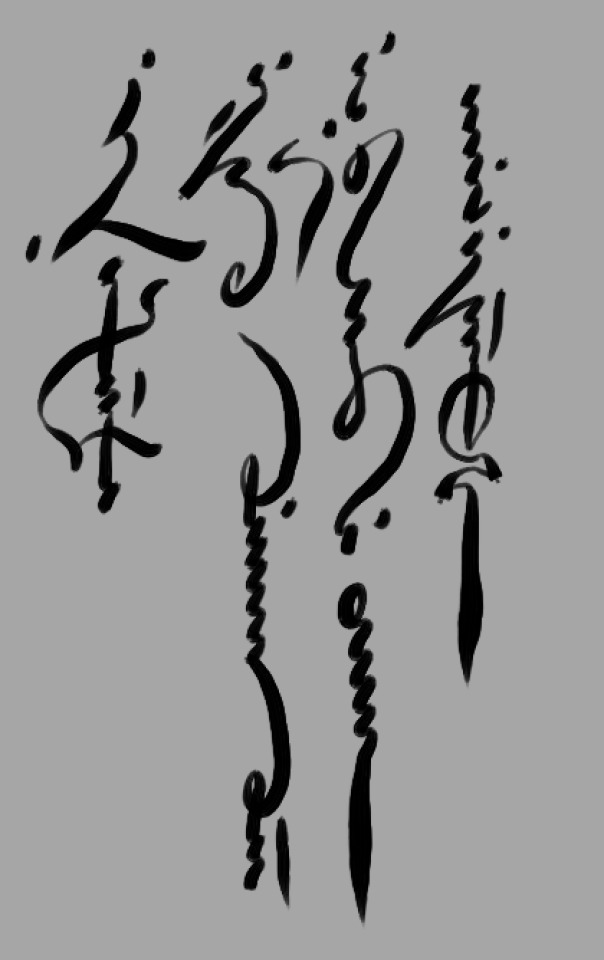
Ikaliila itšis rihaasii ingrhairi yahaš hinišeeq.
#conlang#constructed language#no translation here#anni#sanne#conscript#constructed script#artlang#personal
20 notes
·
View notes
Text
To fuse the tenses with the non-nominative pronouns or to handwave them as surviving intact as regular infixes because they were enforced as a grammar rule with minimal basis in evolution...
Regular infixation pros:
—Easy both to create and to learn
—I've always wanted to have a conlang that used infixes somewhere
—I could be done literally right now
Regular infixation cons:
—Doesn't make a lot of sense when you think about it due to how deeply the case particles fused with the pronouns
Fusional tenses pros:
—Makes more sense
—I'm wanting this conlang to lean fusional
Fusional tenses cons:

#conlang#time travel conlang#two hundred and sixteen new forms...#granted the third-person pronouns have regular plurals so it's really more like two hundred and fourteen
3 notes
·
View notes
Note
Your conlang seems very interesting! Care to infodump a bit, if you want? (I'm genuine) (I'm a language nerd)
It is still in it's infancy so it's a hot mess right now, but I'd love tell y'all about it! It's a mix of all my random amateur language studies and just straight up 'the ghosts told me this word' lol
It's called Akelkiahn, as it is the language of the people of Akelkiah (basically my religions avalon, eden, etc). It's shorthand is AKL. I do have a baby blog @akelkiah where I plan to post in the language and about the culture and shit! I mostly use it as a tag system and when I write spells!
I generated it using vulgarlang.com and have been working at nitpicking the words and shit for a few years. I use IPA reader for pronounciations.I chose Hebrew as the base phonetics because when I have HEARD the language in my dreams and from the spirits it sounded similar, and I figured it was a good start as I would be adding on a LOT of dialects.,the only word I really remember hearing in my dreams was 'kipahnu' which meant 'little rebel', and they also said 'shamat' meant baby. Each of dialect is separated by colour (this diagram is old and messy I made it in like 5 min. names at the bottom are the deities)
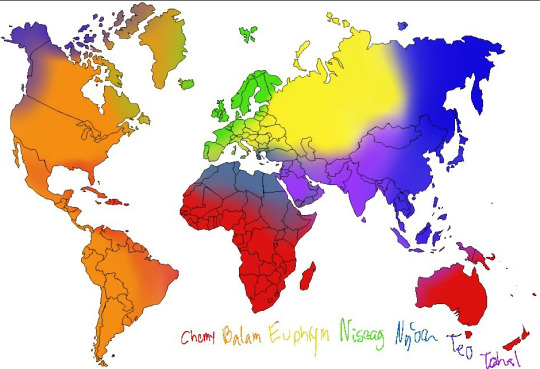
I don't have a script yet and idk anything about lingustics terms or anything so I'll give a little demo of some phrases and break it down.I was a DINGUS and did not save the grammar rules.... so if it's wrong.... let me live.
To cut down on using pronouns over and over, you can mark things by using the last few letters added on to the word. For plurals you just repeat the last letter or syllable. to NEGATE a word, you write or say it backwards. Examples:
petz ge ta'shatohkh (you are sunshine, KH added here makes it MY sunshine, using the pronoun for me- BOKH)
bokh ho ta'shatohkh (Me only sunshine with possessive KH)
petz gish mefu'avkh (you make happyME. the other way to say this would be petz gish bokh mefu'av)
av tmimm ge zmuv (when skies are grey. The word for sky is tmim, extra M makes it skies)
An example using you pronouns petz:
You have snake scales covering your eyes is a phrase to mean 'you are getting in the way of yourself'
boftz malmosh ture' eden meyy (haveYOU snake scales cover up eyes)
Another example is basically the YOLO of the AKL world 'Everything is Nothing' can be translated as two ways:
Zif la paf (literal, everything is nothing) = Zif la fiz (everything is not everything)
also something funny that they told me was being called a chicken (shagufos) in AKL culture is NOT meaning you are scared or skittish, it means you talk too much about yourself, (me me me translation to bokh bokh bokh, sounding like a chicken).
I think the best translation is still the name for the 7 Sisters, the main deities..... is 'dad boy' which is honestly a great gender to have and very fitting for them.
I'm always down to talk about Aklekiahn stuff I'm just nervous about talking about the aliens in my head. lol! If you like any words or ideas feel free to use them, this is a language that is meant to be adapted!
((((((((someday I hope to do this with Hylian, so keep an eye out for that lolol)))))))
#chrisasiaheartman#conlang#constructed language#AKL#bokh dva'#unverified personal gnosis#that's why my link kin tag is linkh because it's bokh link#language#diy deity
11 notes
·
View notes
Text
Starting an indie publishing company be like:
•why won’t the lawyer email me back damnit
•I need a trans, magical, humming conlang that my linguist can translate - but I’m a fuckin dumbass
•do I gotta make my own wire??? Where r u god, it’s me ,, Finley
•why is there no more dungeon meshi to watch
•I have to finish planning the writing retreat for my writers 🤔🤔 how tf that in a week????
#personal#indie publishing#conlangs#trans#I’ve been brainrotting on the Arknights roguelike instead of harassing the lawyer
2 notes
·
View notes
Text
finally figured out what i was doing wrong with bibtex, about a semester too late
#personal post#never remembered to say \bibliography{bibliography.bib} after the very first time i used it#so i didn't know which part i was doing wrong#so i did all of my citations manually for my conlangs final paper aough....
7 notes
·
View notes
Text
This blog is dedicated to my WIP conlang, Plamanetan. (That name is temporary and will probably change throughout the project. I will update this post whenever I change it.) The main purpose of this blog is to get feedback via polls as I work on the project. Any detail about Plamanetan that I post on this blog is subject to change until I finalize the project.
If you are interested in the details of Plamanetan, I will go into detail below the cut. Thoughts and feedback are appreciated but not required :)
A couple notes:
I currently only have 23 words in the vocabulary and am just starting the process of applying new formation guidelines to them so they might all change. For that reason I am not including any specific vocab in this post.
The grammar is VERY loosely defined at the moment because I am still trying to nail down the best approach to it.
Goals & Inspiration
Plamanetan is intended to be an International Auxiliary Language. I started it because 1) I have wanted to make a conlang for a while now, and 2) While watching Conlang Critic I heard him say that he doesn't think an Auxlang can be good (or something to that effect) and I took that as a challenge.
Is that the best motivation? Probably not. But it has gotten me to stick to this project longer than I have stuck to any previous conlang project.
To be more specific about my goals here is a bulleted list of specific targets I have made for myself:
Keep the phonology simple and use sounds that are common across languages.
Avoid loaning words directly from existing languages (to keep cultural neutrality and to avoid bias toward any particular language or language family). (Exceptions may be made for things that are well known by a specific term, if that seems like the best thing to do in that scenario. Probably would only apply for very modern technology or concepts whose terms have been coined recently in a specific language and then adopted around the world.)
Make words sound representative of the thing they refer to by using things like Onomatopoeia and the Kiki/Bouba effect whenever possible (This is the most challenging goal so far)
Be minimalistic with the grammar that is required, but keep in easy workarounds to communicate information that would be lost by omitting a particular feature (For example, making adjectives for male and female for speakers who are used to denoting the sex of living things with grammatical gender.)
Use nouns as a base and derive all words of other types from them using suffixes. (To decrease the amount of vocabulary that has to be memorized without limiting what can be concisely expressed.)
I also intend to eventually create a corresponding sign language with the following goals:
Can be signed with a single hand (To make it more practical to use even if you are holding something.)
Be a 1-to-1 match of the spoken language (so that spoken and signed versions can be used simultaneously without much effort, and so that the signs can be a visual tool for deciphering spoken words you don't recognize.)
The only reason that I haven't started on the signed part yet is because I don't know exactly how to approach it, considering I do not speak any sign languages. I think it would benefit the project though, so I am keeping it in my goals list. I'll learn some ASL before I try to tackle that part.
Phonology & Orthography
So currently what I have is this:

(Ignore the pink "a," that's just because it was added later.)
IPA symbol on the left, Latin alphabet in the brackets. I chose to use the Latin alphabet because it is the most common writing system and also because its the only one I can type.
I came to these sounds by:
Using a very messy not-really-criteria criteria to pick 15 source languages across various language families. (Lithuanian, Russian, English, German, Hindi, Bengali, Spanish, Mandarin Chinese, Swahili, Yoruba, Arabic, Hausa, Somali, Indonesian, Malay)
Going through the wikipedia page for each language's phonology and writing down all the sounds on the chart.
Making a list of all the sounds that showed up in at least 2/3 of those phonologies.
Picking sounds from that list while avoiding voicing distinctions and any sounds that seemed a little too similar too another sound.
As for punctuation, its pretty much just English. Period (.) to end a sentence, comma (,) to separate clauses, quotation marks ("") for quotes and dialogue, exclamation point (!) for exclamations, and a question mark (?) for questions (though I plan to add a question particle so that may be redundant). I'll edit later as I get a clearer structure for the grammar.
Phonotactics
I decided that syllables in Plamanetan will have a ccvc structure. The only restrictions on what can go where are in regards to consonant clusters in the onset.
I allowed for consonant clusters at the start of syllables to give myself a little more flexibility in word formation. I chose the permitted clusters based purely on what I personally think are relatively simple sound combinations because I cannot for the life of me find documentation on this topic for any of the source languages. Its pure guesswork which really isn't good for my goals but its the best I got. Anyway, here's my list of permitted consonant clusters:
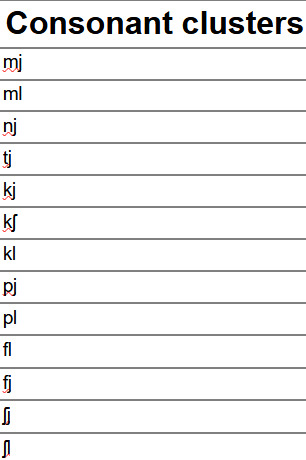
I originally had a list of diphthongs with this but decided to remove them so that I can write vowels next to each other without confusion. They weren't that necessary and I think its easier without them.
Also, not sure if it belongs in this category but Plamanetan words have an alternating stress pattern starting with the first syllable. so like Plamanetan.
Grammar
As I mentioned before, the grammar is the least developed part of this language so far. Or at least, its the part that feels most incomplete to me because I'm not very satisfied with it yet. And also my personal notes on it are very messy.
First thing I decided on was word order. I chose SVO as the primary word order because it was the most common among the source languages. Originally I wrote that the SVO order would be very strict, but I think the fact that different word types have different endings may allow for some flexibility. I also decided that words that modify a noun or verb should come after the thing they modify (like in Spanish) rather than before (like in English). I don't remember if I had a reason for that choice.
As stated in the goals, I have chosen to base the entire vocabulary on nouns. Every non-noun word must correspond to a noun of an equivalent or at least related concept. These words are formed by adding suffixes.

I'll probably make some exceptions to this rule for conjunctions and adpositions unless I can come up with a creative way to implement them. Because I don't think that the "add suffix, now you're done" method works very well for these words. Maybe adpositions could be treated as adjectives? I'll figure it out later.
(You may also notice that this is very regular. No exceptions to grammar rules. This is on purpose because it makes the language easier and I have no intention of making this naturalistic.)
I decided to omit verb conjugations and instead have time information be communicated by adding words like "yesterday," "tomorrow," and "5 minutes ago." If time is necessary it can be added to the sentence. My logic here is that its easier to not require a grammatical distinction by making the information optional than it is for someone whose language doesn't have this grammatical distinction to be required to learn it. But if I find a good reason why it would be easier or more intuitive to add tense then I will do so.
^Same concept applies to other grammatical features such as gender, plurality, possession, mood, and evidentiality. Its easier not to require speakers to figure it out if their language doesn't have it. My only concern is that this will over inflate the sentence size and make it hard to follow what is being said. If you're interested enough to have read this far, I would love to hear your thoughts on this because I am truly torn on whether or not this is a good idea.
Word formation
And finally, the most recent thing I have added is a rough outline of how I intend to make words sound like what they mean. I may make edits to this process in the future but for now this is the system I am running my vocabulary decisions through. Most of this is based on what I intuitively think sounds best for these concepts so it may be English-speaker biased. But there's not really a lot of actual information out there on this topic for me to pull from so this is the best I've got.

As you may be able to tell if you squint, this is the part that I tried to derive from the Kiki/Bouba phenomenon. I'm not sure if I fully understand how it works (I mean, no one fully does. But as far as whats known I am unsure,) and I also made up some of my own things. But hopefully this system has the desired effect. I'll test with polls as I go to see if people can accurately guess what a word is supposed to mean based on its sound.
----------
If you read this far, thank you! I'm glad someone found this interesting! If you have any thoughts, questions, or suggestions I would love to hear them.
I hope you stick around!
#Conlang#WIP#language creation#conlang critic#jan misali#universal language#grammar#linguistics#language#conlanger#conlanging#personal project#work in progress
2 notes
·
View notes